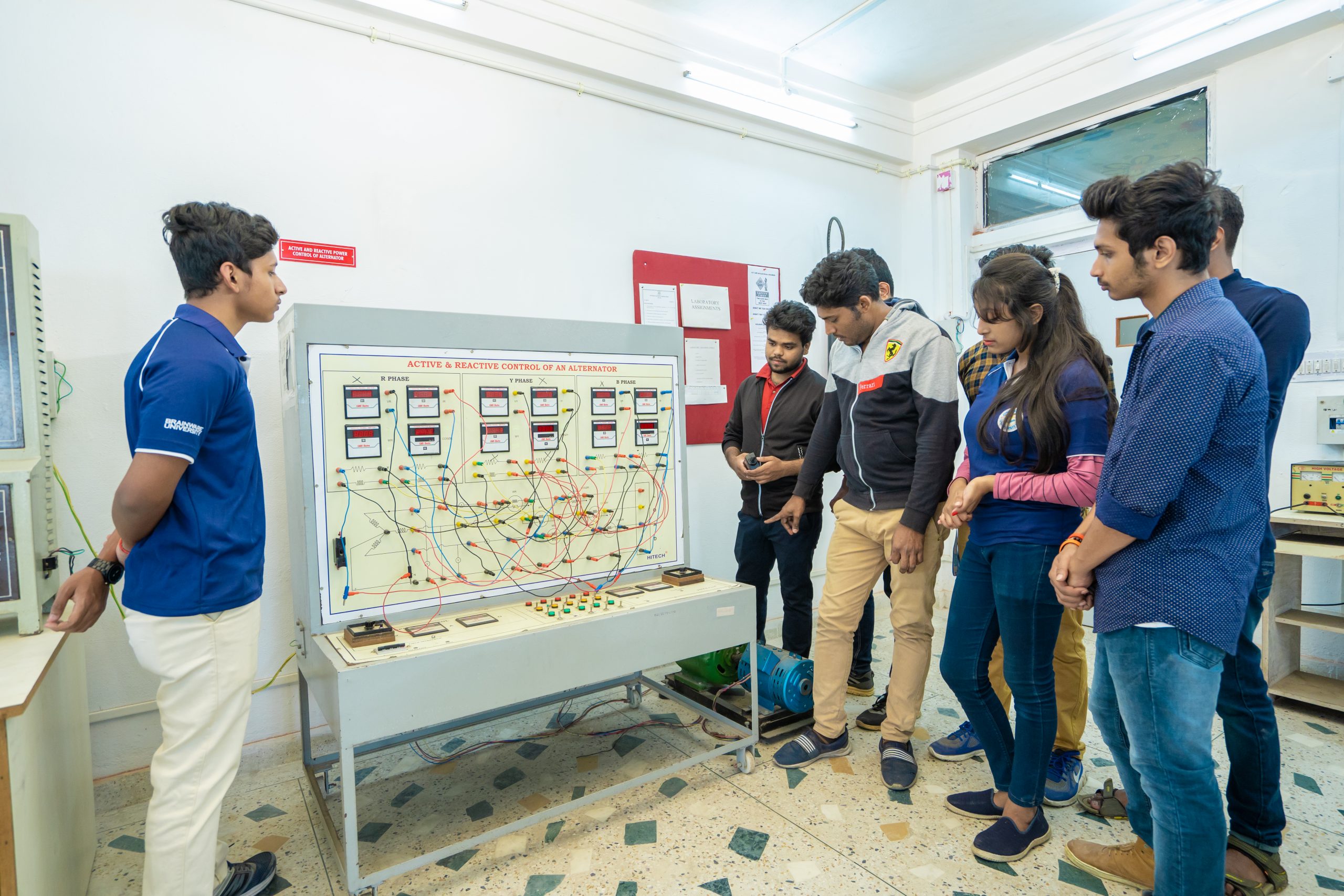
In today’s rapidly advancing world, electrical engineering stands as one of the most critical and dynamic fields. Many students are increasingly interested in pursuing short vocational courses that equip them with job-ready skills. As a result, the demand for diploma courses is also on the rise, especially among those eager to enter the professional world at the earliest opportunity. One of these sought-after diploma courses is the electrical engineering diploma at Brainware University. So, if you aspire to embark on a rewarding career in this field, earning an Electrical Engineering Diploma can be a stepping stone towards fulfilling your dreams. In this blog, let us explore the significance of an electrical engineering diploma, mainly focusing on the offerings of Brainware University and its Polytechnic Electrical Engineering program. From eligibility requirements and admission procedures to course fees, we will provide comprehensive insights to help you make an informed decision.
What is an Electrical Engineering Diploma?
Typically, a Diploma course comprises theoretical and practical sessions covering essential engineering principles. An electrical engineering diploma is a specialized program, necessary to work in the electrical engineering industry and it caters to individuals seeking entry-level positions in various sectors. Upon completing their 10th or 12th standard, students have the option to enrol in an electrical engineering diploma course, after the completion of which they may directly enter the 2nd year of B.E. or B. Tech. courses.
Benefits of an Electrical Engineering Diploma after 10th and 12th:
The electrical engineering diploma course at Brainware University has certain benefits which the students can avail, for example:
- Practical Hands-on Learning: Our electrical engineering diploma places a significant emphasis on practical learning, deviating from standardised 11th, 12th and general college degrees. We encourage students to gain valuable experience with real-world projects and lab exercises, rather than spending time writing assignments. This hands-on approach prepares graduates to tackle engineering challenges effectively in their future careers.
- Industry-Relevant Skills: The electrical diploma program equips students with the skills which will be beneficial in the job market. Our institution ensures students acquire problem-solving abilities, technical expertise, and proficiency in using cutting-edge tools and software.
- Placement and Career Opportunities: Graduates with an electrical engineering diploma can enter the workforce promptly, obtaining roles such as electrical technician, assistant engineer, or electronics assembler. Furthermore, it is a great stepping stone for pursuing higher studies in electrical engineering, leading to more specialized and lucrative positions.
Eligibility Requirements for Admission in Electrical Engineering Diploma:
- Students who are eligible for the polytechnic electrical engineering programme at Brainware University, are
- Students who have secured 40% marks or equivalent grades in the Madhyamik examination from any recognised board.
- Candidates who have successfully cleared the Higher Secondary (10+2) Vocational Examination conducted by the West Bengal State Council of Technical and Vocational Education and Skill Development (Vocational Education Division)
- Students who have completed a continuous 2-year ITI program after passing the Madhyamik or equivalent examination
- Individuals who have passed the 10+2 examination with compulsory subjects of Physics and Chemistry along with Mathematics or Biology from a recognized Board, Council, or Institute are eligible for the course.
Admission Procedures for Electrical Engineering Diploma Course:
Our Admission team consists of trained and competent academic counsellors who are readily available to guide students through their programme selection until they step into our premises.
- Choose the Diploma programme according to your preference.
- Apply online or get in touch with the Admission Department at 1800 208 6916.
- Obtain and fill up the online admission form with the necessary details.
- Appear in the Brainware Entrance Test (BET) and qualify.
- Submit all the required documents as soft copies for admission via email/WhatsApp to the designated contact person.
- Make the payment using NEFT, IMPS, or UPI, and share the payment details with the contact person through email/WhatsApp.
- Follow the procedure for the “Anti-Ragging form,” with guidance provided by our admission cell.
- Upon completion of the admission process, Brainware University will issue an Admission Letter to confirm your admission.
Course fees:
At Brainware University, our goal is to impart quality education at an affordable rate. Hence, our 3-year polytechnic electrical engineering course cost 1,37,200 and the 2-year course cost 1,14,800 in total. It should be noted, our Brainware University Merit Scholarships are also granted every year to students with excellent academic records, which will fully/ partially weave their tuition fees.
Curriculum of Polytechnic/ Diploma Electrical Engineering Program:
Brainware University is renowned for its commitment to providing quality education and producing industry-ready graduates. The Polytechnic Electrical Engineering program offered by Brainware University covers,
- Communicative English
- Computer Fundamentals
- Mathematics
- Chemistry
- Physics
- Engineering drawing
- Data Structure and Algorithm
- Development of Life Skill
- Transmission and Distribution of Power
- Applied and Digital Electronics
- Microprocessor and Microcontroller
- Industrial Project and Entrepreneurship Development
- Industrial Management
Career Opportunities for Polytechnic/ Diploma Electrical Engineering Students:
After completing a diploma in electrical engineering, graduates have a wide range of career options to explore. Spanning various industries, students will be offered opportunities for growth and specialization. Let’s elaborate on some of the career options available to diploma holders in electrical engineering:
Government jobs after Diploma in Electrical Engineering:
Various government departments like Railways, Central Public Works Department (CPWD), Military Engineering Services (MES), State Public Works Departments, etc. frequently publish vacancies for Electrical engineering diploma holders.
- Technician: Various government organizations and PSUs hire diploma holders as technicians for maintaining electrical equipment and carrying out repairs in various departments like telecommunications, railways, defence, etc.
- Assistant Engineer (AE): While some states require a Bachelor’s degree for this position, some others have vacancies for electrical diploma holders in electrical engineering.
- Power Distribution Companies (DISCOMs): Various state electricity distribution companies recruit diploma holders in electrical engineering for roles related to power distribution, meter reading, billing, and customer service.
- Indian Railways: Indian Railways frequently announces job openings for diploma holders in electrical engineering in various technical positions related to traction, signalling, maintenance, etc.
- Defence: Organizations like the Indian Army, Indian Navy, and Indian Air Force hire electrical diploma holders in electrical engineering for technical roles in their electrical and electronics divisions.
- Public Sector Undertakings (PSUs): PSUs like National Thermal Power Corporation (NTPC), Bharat Heavy Electricals Limited (BHEL), Oil and Natural Gas Corporation (ONGC), etc., offer job opportunities for diploma holders in electrical engineering in technical roles.
- State Electricity Boards: State Electricity Boards and Power Generation Companies hire diploma holders for positions in power generation, transmission, and distribution departments.
Besides Government sectors, students may take up the following positions in private organisations:
- Workshop Manager: In this role, you would be managing the day-to-day operations of an electrical workshop. Your responsibilities may include organizing work schedules, supervising technicians, ensuring equipment maintenance, and facilitating the smooth functioning of electrical projects.
- Project Head: As a Project Head, you would be in charge of managing electrical projects from inception to completion. You would be responsible for project planning, budgeting, resource allocation, and coordinating various teams to ensure successful project delivery.
- Operations Manager: An Operations Manager in the electrical engineering field oversees the overall operational activities of an organization or department. This role involves optimizing processes, managing resources efficiently, and implementing strategies to enhance productivity and performance.
- Engineering Technologist: As an Engineering Technologist, you would bridge the gap between engineering theory and practical applications. Your role would involve applying engineering principles to solve technical problems, conducting tests, and assisting engineers in the design and development of electrical systems.
- Electrical Product Development and Test Engineer: Electrical diploma holders would be involved in designing, developing, and testing electrical products and systems. You may work in industries like electronics manufacturing, consumer electronics, or automotive, contributing to the creation of innovative electrical devices.
- Design Engineer: As a Design Engineer, you would focus on creating detailed plans and specifications for electrical systems and components. You would use computer-aided design (CAD) software to develop and analyse electrical strategies, ensuring they meet safety and performance standards.
Salary Expectations for Electrical Engineering Diploma Holders:
The salary of an Electrical Engineering Diploma holder in India can vary based on the type of industry, job role, years of experience, and the specific company. Generally, the starting salary you can expect as a fresh diploma holder in electrical engineering should be around 3- 3.5 LPA.
Conclusion
Overall, an electrical engineering diploma from a reputable institution like Brainware University can open up a world of opportunities in the fast-paced and ever-evolving field of electrical engineering. With a well-structured curriculum, hands-on training, and exposure to industry practices, graduates are well-equipped to take on challenges and contribute significantly to technological advancements. Aspiring electrical engineers should consider the eligibility requirements, admission procedures, and course fees, before making an informed decision about pursuing this rewarding polytechnic program. In 2022, 98% of our students have been placed with the highest 36 LPA. With determination, dedication, and the proper educational foundation, you too can lay the groundwork for a successful and fulfilling career in electrical engineering. For further information, click on the electrical diploma and visit the official website.






